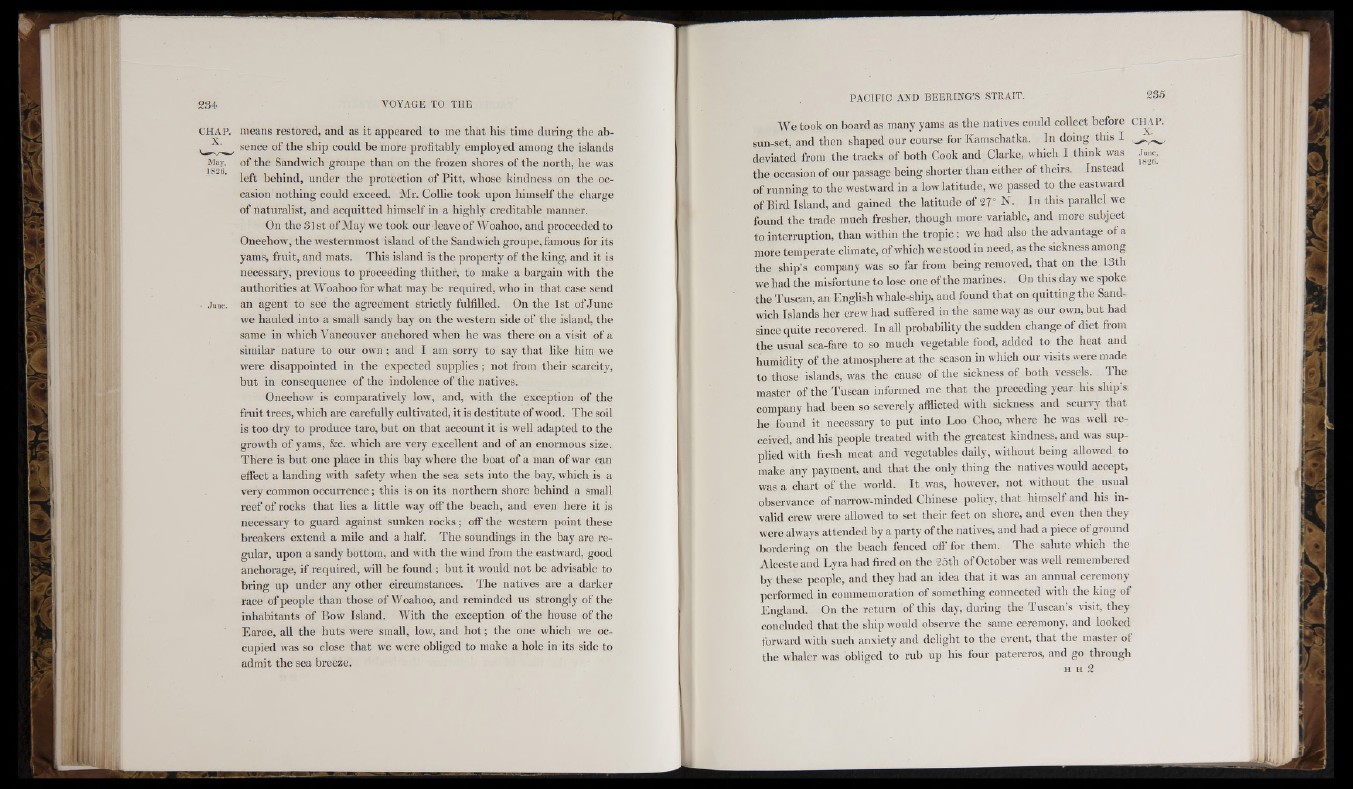
T "
CHAR
X
!Mav,
1S26.
WK-%
K'/ ■
means restored, and as it appeared to me that his time during the absence
of the ship could be more profitably employed among the islands
of the Sandwich groupe than on the frozen shores of the north, he was
left behind, under the protection of Pitt, whose kindness on the occasion
nothing could exceed. Mr. Collie took upon himself the charge
of naturalist, and acquitted himself in a highly creditable manner.
On the 81 St of Alay we took our leave of AA"oahoo, and proceeded to
Oneehow, the westernmost island of the Sandwich groupe, famous for its
yams, fruit, and mats. This island is the property of the king, and it is
necessary, previous to proceeding thither, to make a bargain with the
authorities at AVoahoo for what may be required, who in that case send
an agent to see the agreement strictly fulfilled. On the 1st of June
we hauled into a small sandy bay on the western side of the island, the
same in which A'ancouver anchored when he was there on a visit of a
similar nature to our own ; and I am sorry to say that like him we
were disap]iointed in the expected supplies ; not from their scarcity,
but in consequence of the indolence of the natives.
Oneehow is comparatively low, and, with the exception of the
fruit trees, which are carefully cultivated, it is destitute of wood. The soil
is too dry to produce taro, but on that account it is well adapted to the
growth of yams, &c. which are very excellent and of an enormous size.
There is but one place in this hay where the boat of a man of war can
effect a landing with safety when the sea sets into the bay, which is a
very common occurrence; this is on its northern shore behind a small
reef of rocks that lies a little way off the beach, and even here it is
necessary to guard against sunken rocks; off the western point these
breakers extend a mile and a half. The soundings in the bay are regular,
upon a sandy bottom, and with the wind from the eastward, good
anchorage, if required, will be found ; but it would not be advisable to
bring up under any other circumstances. The natives are a darker
race of people than those of Woahoo, and reminded us strongly of the
inhabitants of Bow Island. With the exception of the house of the
Earee, all the huts were small, low, and h o t; the one which we occupied
was so close that we were obhged to make a hole in its side to
admit the sea breeze.
AA"e took on board as many yams as the natives could collect before CtolP.
sun-set, and then shaped our course for Kamsehatka. In doing this I
deviated from the tracks of both Cook and Clarke, which I think was
the occasion of our passage being shorter than either ol theirs. Instead
of running to the westward in a low latitude, we passed to the eastward
of Bird Island, and gained the latitude of 27° N. In this parallel we
found the trade much fresher, though more variable, and more subject
to interruption, than within the tropic ; we had also the advantage of a
more temperate climate, of which we stood in need, as the sickness among
the ship’s company was so far from being removed, that on the 13th
we had the misfortune to lose one of the marines. On this day we spoke
the Tuscan, an English whale-ship, and found that on quitting the Sandwich
Islands her crew had suffered in the same way as our own, but had
since quite recovered. In all probability the sudden change of diet from
the usual sea-fare to so much vegetable food, added to the heat and
humidity of the atmosphere at the season in which our visits were made
to those islands, was the cause of the sickness of both vessels. The
master of the Tuscan informed me that the preceding year his ship’s
company had been so severely afflicted with sickness and scurvy that
he found it necessary to put into Loo Choo, where he was well received,
and his people treated with the greatest kindness, and was supplied
with fresh meat and vegetables daily, without being allowed to
make any payment, and that the only thing the natives w ould accept,
was a chart of the world. It was, however, not without the usual
observance of narrow'.ininded Chinese policy, that himself and his invalid
crew were allowed to set their feet on shore, and even then they
were always attended by a party of the natives, and had a piece of ground
bordering on the beach fenced off for them. The salute which the
Alceste and Lyra had fired on the 25th of October was well remembered
by these people, and they had an idea that it was an annual ceremony
performed in commemoration of something connected with the king of
England. On the return of this day, during the Tuscan’s visit, they
concluded that the ship would observe the same ceremony, and looked
forward with such anxiety and delight to the event, that the master of
the whaler was obliged to nib up his four patereros, and go through
June,
1826.